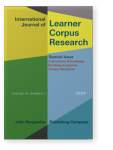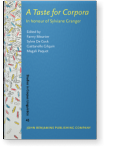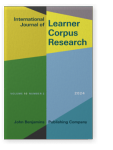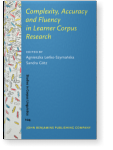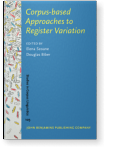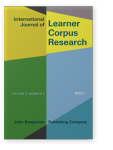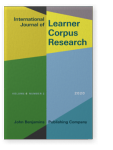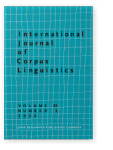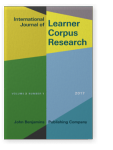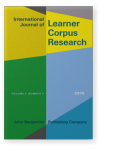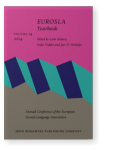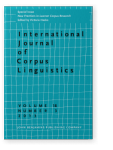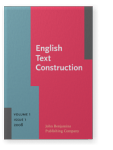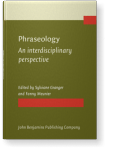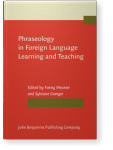Magali Paquot
List of John Benjamins publications for which Magali Paquot plays a role.
Journal
Title
A Taste for Corpora: In honour of Sylviane Granger
Edited by Fanny Meunier, Sylvie De Cock, Gaëtanelle Gilquin and Magali Paquot
[Studies in Corpus Linguistics, 45] 2011. xv, 295 pp.
Subjects Corpus linguistics | Theoretical linguistics
2025 Phraseological sophistication as a multidimensional construct: Exploring the relationship between association, register specificity and frequency of word combinations Cumulative Knowledge Building in Learner Corpus Research, Larsson, Tove and Douglas Biber (eds.), pp. 217–244 | Article
Since Paquot (2019), several unresolved issues have persisted regarding the operationalization of phraseological sophistication in L2 complexity research. One of the most crucial concerns relates to the extent to which the commonly used measures of phraseological sophistication (MI scores) fully… read more
2024 Future-time reference in spoken EFL: More complex than in ENL? Journal of Second Language Studies: Online-First Articles | Article
Previous research has given much attention to how native speakers of English and, to a lesser extent, speakers of World Englishes, choose between will and be going to to talk about the future. There is, however, a lack of research investigating how learners of English as a Foreign Language… read more
2024 Ten years of the International Journal of Learner Corpus Research International Journal of Learner Corpus Research 10:2, pp. 241–246 | Editorial
2024 The Core Metadata Schema for Learner Corpora (LC-meta): Collaborative efforts to advance data discoverability, metadata quality and study comparability in L2 research International Journal of Learner Corpus Research 10:2, pp. 280–300 | Article
Metadata is critical throughout the research process, from study design to corpus selection/compilation, result interpretability and cumulative research. To date, however, learner corpus research has not developed community standards or best practices for metadata collection and sharing. In this… read more
2022 Phraseological complexity in EFL learners’ spoken production across proficiency levels Complexity, Accuracy and Fluency in Learner Corpus Research, Leńko-Szymańska, Agnieszka and Sandra Götz (eds.), pp. 115–136 | Chapter
This study explores phraseological complexity in English as a Foreign Language (EFL) learners’ spoken production across proficiency levels in the Trinity Lancaster Corpus. Phraseological diversity and sophistication are operationalized as root type-token ratios and median mutual information… read more
2021 Chapter 9. On the importance of register in learner writing: A multi-dimensional approach Corpus-based Approaches to Register Variation, Seoane, Elena and Douglas Biber (eds.), pp. 235–258 | Chapter
The present study explores the relative importance of register in learner writing vis-à-vis learner-internal factors such as first-language background. Using multi-dimensional analysis, the study looks at learner and native-speaker student writing from two registers (argumentative essays and… read more
2021 Applying phraseological complexity measures to L2 French: A partial replication study International Journal of Learner Corpus Research 7:2, pp. 197–229 | Article
This study partially replicates Paquot’s (2018, 2019) study of phraseological complexity in L2 English by investigating how phraseological complexity compares across proficiency levels as well as how phraseological complexity measures relate to lexical, syntactic and morphological complexity… read more
2020 Inter-rater reliability in Learner Corpus Research: Insights from a collaborative study on adverb placement International Journal of Learner Corpus Research 6:2, pp. 237–251 | Article
In Learner Corpus Research (LCR), a common source of errors stems from manual coding and annotation of linguistic features. To estimate the amount of error present in a coded dataset, coefficients of inter-rater reliability are used. However, despite the importance of reliability and internal… read more
2020 Adverb placement in EFL academic writing: Going beyond syntactic transfer International Journal of Corpus Linguistics 25:2, pp. 156–185 | Article
The present study looks at adverb placement in expert writing and in first-language and second-language novice spoken and written production. The extent to which first-language (L1) transfer is still present in advanced learners’ written production is also investigated. The study uses data from… read more
2017 Quantitative research methods and study quality in learner corpus research International Journal of Learner Corpus Research 3:1, pp. 61–94 | Article
This study aims to provide the first empirical assessment of quantitative research methods and study quality in learner corpus research. We systematically review quantitative primary studies referenced in the Learner Corpus Bibliography (LCB), a representative bibliography of learner corpus… read more
2015 An interview with Yukio Tono International Journal of Learner Corpus Research 1:1, pp. 160–171 | Article
2014 Cross-linguistic influence and formulaic language: Recurrent word sequences in French learner writing EUROSLA Yearbook: Volume 14 (2014), Roberts, Leah, Ineke Vedder and Jan H. Hulstijn (eds.), pp. 240–261 | Article
This chapter reports on a follow-up study to Paquot (2013) which replicates its methodology to investigate transfer effects on French EFL learners’ use of recurrent word sequences. The study focuses on a large dataset of two- to four-word lexical bundles overrepresented in the French component of… read more
2013 Lexical bundles and L1 transfer effects New Frontiers in Learner Corpus Research, Hasko, Victoria (ed.), pp. 391–417 | Article
This exploratory study makes use of Jarvis’s (2000) methodological framework to investigate transfer effects on French EFL learners’ use of lexical bundles. The study focuses on 3-word recurrent sequences that include a lexical verb in the French component of the International Corpus of Learner… read more
2011 Putting corpora to good uses: A guided tour A Taste for Corpora: In honour of Sylviane Granger, Meunier, Fanny, Sylvie De Cock, Gaëtanelle Gilquin and Magali Paquot (eds.), pp. 1–6 | Article
2008 Too chatty: Learner academic writing and register variation English Text Construction 1:1, pp. 41–61 | Article
The study reported on in this paper uses corpus data in order to examine how upper-intermediate to advanced EFL learners from a wide range of mother tongue backgrounds perform a number of rhetorical functions particularly prominent in academic discourse, and how this compares with native academic… read more
2008 2. Disentangling the phraseological web Phraseology: An interdisciplinary perspective, Granger, Sylviane and Fanny Meunier (eds.), pp. 27–49 | Article
Although phraseology has recently begun to establish itself as a field in its own right, this process is being hindered by two main factors: the highly variable and wide-ranging scope of the field and the vast and confusing terminology associated with it. This chapter tackles these two issues… read more
2008 Exemplification in learner writing: A cross-linguistic perspective Phraseology in Foreign Language Learning and Teaching, Meunier, Fanny and Sylviane Granger (eds.), pp. 101–119 | Article
The aim of the case study reported in this chapter is to examine the potential influence of the mother tongue on learners’ production of both correct and incorrect multi-word units that are typically used to fulfil an important rhetorical function, namely exemplification, in academic writing. The… read more
